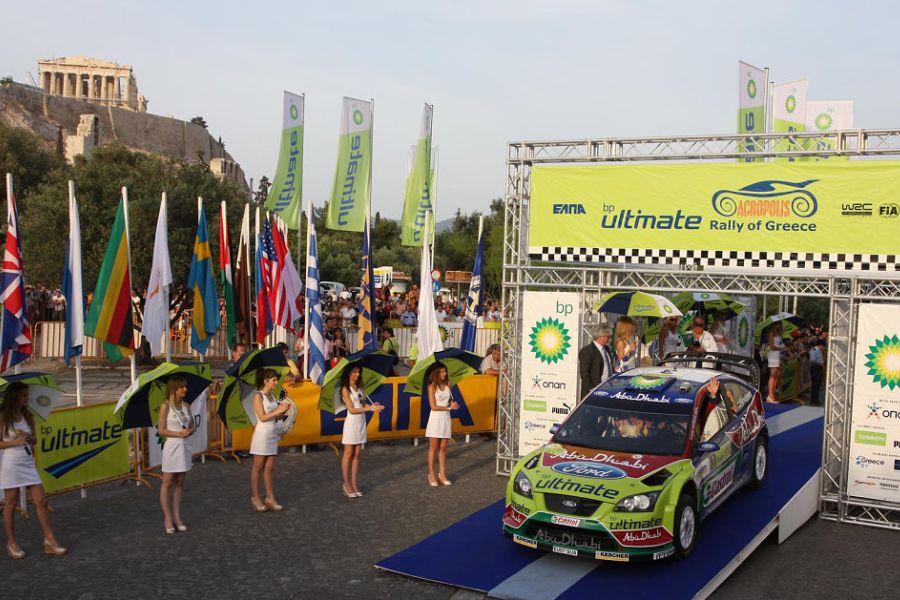Acropolis Rally of Greece - Top Class Rally on Ancient Territory
The Acropolis Rally of Greece is a rally event, organized for the first time in 1951, which was an integral part of the World Rally Championship from the inaugural season in 1973 to 2013. Today, Acropolis Rally is a part of the European Rally Championship calendar. The rally was previously a part of the ERC between 1956 and 1968.
Acropolis Rally is a gravel rally and is considered as one of the toughest rallies, taking place on rough and rocky mountain roads in central Greece and combining heat and dust. The rally base is in Lamia, about 200 km north of Athens.

Colin McRae is a legend of Acropolis Rally
Colin McRae as record-holder with five wins
The record holder with five wins at Acropolis Rally is late Colin McRae, who won for the first time in 1996 in a Subaru Impreza 555 and then in 1998 (Subaru Impreza WRC), 2000, 2001 and 2002 (Ford Focus RS WRC).
Four drivers scored three wins in Greece: Miki Biasion, Carlos Sainz, Walter Röhrl and Sebastien Loeb. In a post-WRC era, Polish race ace Kajetan Kajetanowicz triumphed two times in Greece.
ELPA organized the first rally event in 1951
It all started in 1951 when the Automobile and Touring Club of Greece (ELPA) organized an ELPA Rally as a national event.
The first ever winner was Greek driver Petros Peratikos in a Fiat. The event is bearing a name Acropolis Rally since 1953. That year, Nicos Papamichael won in a Jaguar XK 120.

Starting ramp under the ancient Acropolis
Part of the European Rally Championship since 1956
In 1956, the rally became a part of the European Rally Championship and the first international winner was the German Walter Schock in 1956 in a Mercedes-Benz 300 SL. Walter Shock triumphed one more time, in 1960, becoming the first two-time winner.
The other winners in the ERC period, which lasted until 1968, were Jean-Pierre Estager (Ferrari 250 GT), Luigi Villoresi (Lancia Aurelia B20 GT), Wolfgang Levy (Auto Union 1000), Erik Carlsson (Saab 96), Eugen Böhringer (Mercedes 220 SE and 300 SE), Tom Trana (Volvo PV 544), Carl-Magnus Skogh (Volvo Amazon 122S), Bengt Söderström (Ford Cortina Lotus), Paddy Hopkirk (Mini Cooper S) and Roger Clark (Ford Escort Twin Cam).
Part of the Manufacturers’ championship
From 1969, the rally was a part of the Manufacturers’ championship, first on the European level in 1969 and then as the International Championship for Manufacturers (IMC) from 1970 to 1972.
The winner of the 1969 event was Pauli Toivonen in a Porsche 911 S. In the following years, the winners of the IMC round were Jean-Luc Therier (Alpine-Renault A110), Ove Andersson (Alpine-Renault A110) and Hakan Lindberg (Fiat 124 Sport Spider).

The 21st Acropolis Rally in 1973 was a part of the inaugural World Rally Championship
Part of the World Rally Championship from 1973 to 2013
In 1973, the World Rally Championship has been established and the 21st Acropolis Rally was a part of the championship calendar, as the sixth round in the 13-event schedule. The event took part on the last weekend of May in the mountains north of Athens.
After becoming an integral part of the WRC, Acropolis Rally stayed a part of the championship for the next forty years with only three exceptions. In 1974, the event was cancelled due to an oil crisis. In 1995, the rally was a part of the 2-Litre Championship instead of WRC. The event has been cancelled one more time in 2010.
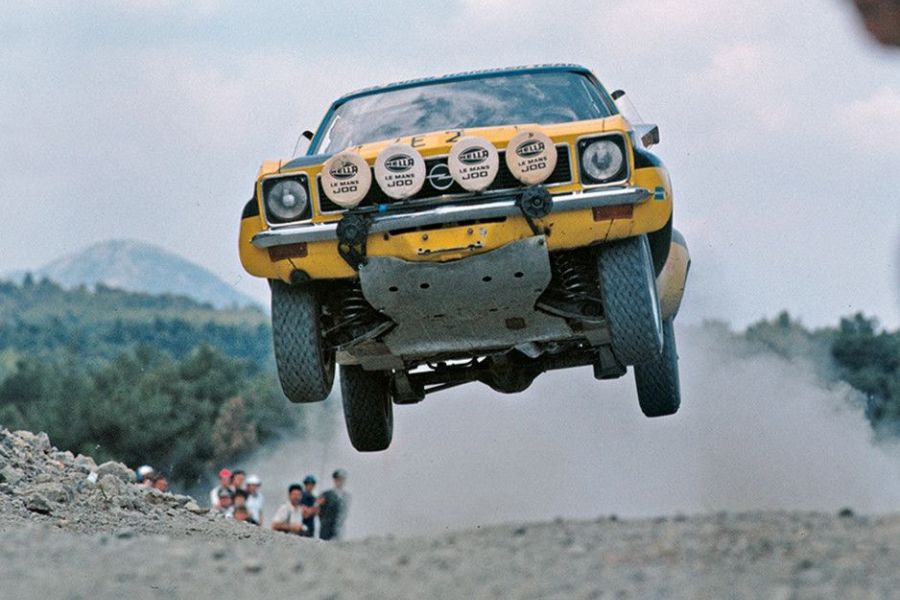
Walter Rohrl and Jochen Berger were flying at 1975 Acropolis Rally in an Opel Ascona
Walter Röhrl was the first three-time winner
The first-ever winner of the Greek WRC round was Jean-Luc Therier in the #1 Alpine-Renault A110 1800. He defeated Rauno Aaltonen and Jean-Pierre Nicolas.
Walter Röhrl scored his first of three wins in 1975, driving the #2 Opel Ascona 1.9 SR. His next win came in 1978 in a Fiat 131 Abarth. He waited five years for his third win, triumphing in 1983 in a Lancia 037 Rally.
In that period, the other winners were Harry Kallstrom (1976, Datsun Violet 160J), Bjorn Waldegard (1977 and 1979, Ford Escort RS 1800) and Ari Vatanen (1980 and 1981, Ford Escort RS 1800).
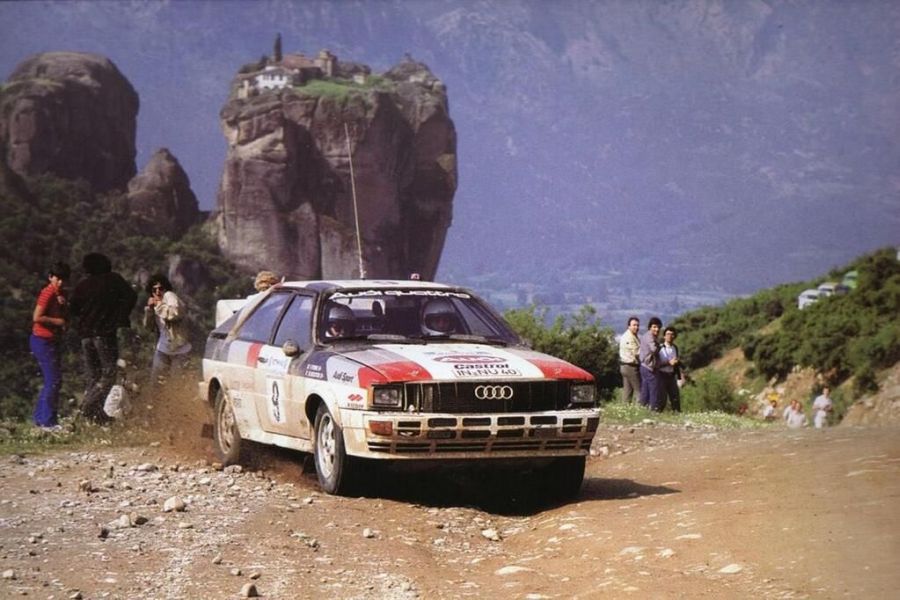
Michele Mouton was driving the #9 Audi Quattro to victory at 1982 Acropolis Rally
Victory for rally queen Michele Mouton in 1982
In 1982, Michele Mouton won Acropolis Rally in an Audi Quattro, starting an era of four-wheel-drive cars. It was her second win that year after she won in Portugal. Later in the season, she won in Brazil and finished second in the World Rally Championship classification.
In the Group B era, victorious drivers in Greece were Walter Röhrl (1983, Lancia 037 Rally), Stig Blomqvist (Audi Quattro A2), Timo Salonen and Juha Kankkunen (both in a Peugeot 205 Turbo 16 E2).

Miki Biasion in the #7 Ford Escort RS Cosworth at 1993 Rally Acropolis
Three wins for Miki Biasion between 1988 and 1993
In the Group A era, which started in 1987, the first winner was Markku Alen in a Lancia Delta HF 4WD. Miki Biasion then scored two consecutive wins in a Lancia Delta Integrale in 1988 and 1989.
His third victory came in 1993 at the wheel of Ford Escort RS Cosworth. The other winners in that period were Carlos Sainz (1990, Toyota Celica GT-Four), Juha Kankkunen (1991, Lancia Delta Integrale 16V) and Didier Auriol (1992, Lancia Delta HF Integrale).
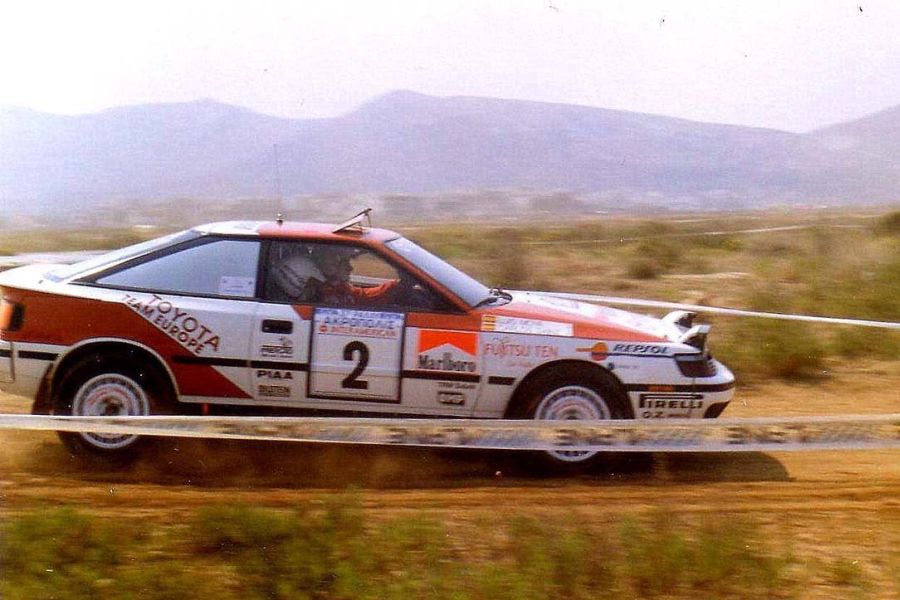
Carlos Sainz in the #2 Toyota Celica GT-4 at 1990 Acropolis Rally
Three wins for Carlos Sainz between 1990 and 1997
Carlos Sainz started his winning streak in 1990 in a Toyota Celica. He returned to the top podium spot again in 1994, driving a Subaru Impreza 555. His third win was achieved with the third different car, in 1997 in a Ford Escort WRC.
In 1995, the event was a part of the 2-Litre World Championship and the Greek driver Aris Vovos won in a Lancia Delta HF Integrale.
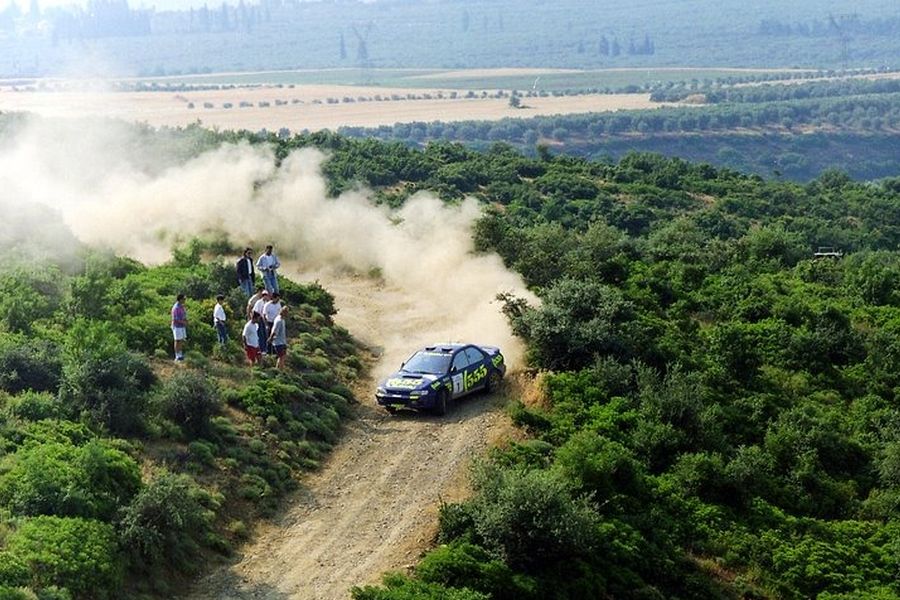
Colin McRae’s #1 Subaru Impreza 555 at 1996 Acropolis Rally
Colin McRae became Acropolis King with five wins
Colin McRae scored his first win at Acropolis Rally in 1996. The defending champion was driving the #1 Subaru Impreza 555, defeating Tommi Makinen (Mitsubishi) and Carlos Sainz (Ford). Sainz took the first win in the World Rally Cars era in 1997, then McRae won in a Subaru Impreza S4 WRC in 1998.
Richard Burns gave one more win to Subaru World Rally Team in 1999 and then Colin McRae continued his reign in a Ford Focus RS WRC, scoring three consecutive wins from 2000 to 2002. In Colin’s five wins, his navigators were Derek Ringer (1996) and Nicky Grist (four times).
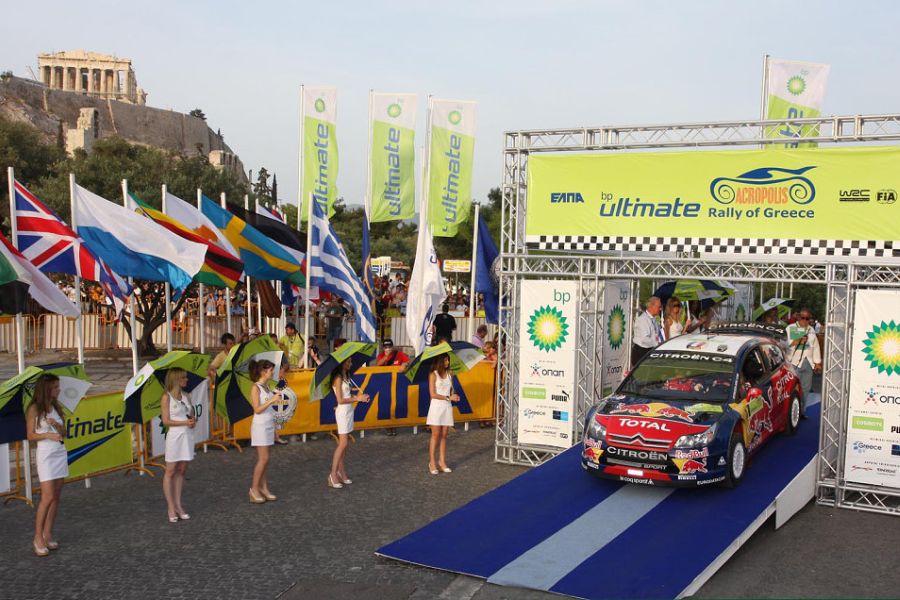
Sebastien Loeb’s car at 2008 Acropolis Rally of Greece
Three wins for Sebastien Loeb between 2005 and 2012
The Estonian Markko Martin continued winning streak of Ford in 2003, then Petter Solberg gave one more win to Subaru in 2004, and then Sebastien Loeb triumphed for the first time in 2005, driving a Citroen Xsara WRC. Loeb’s next win came in 2008 in a Citroen C4 WRC. For the third victory, in 2012, he was using the third car – the Citroen DS3 WRC.
Besides Loeb, the other winners in that period were Marcus Gronholm (2006 and 2007, Ford Focus RS WRC), Mikko Hirvonen (2009, Ford Focus RS WRC), Sebastien Ogier (2011, Citroen DS3 WRC) and Jari-Matti Latvala (2013, Volkswagen Polo R WRC).
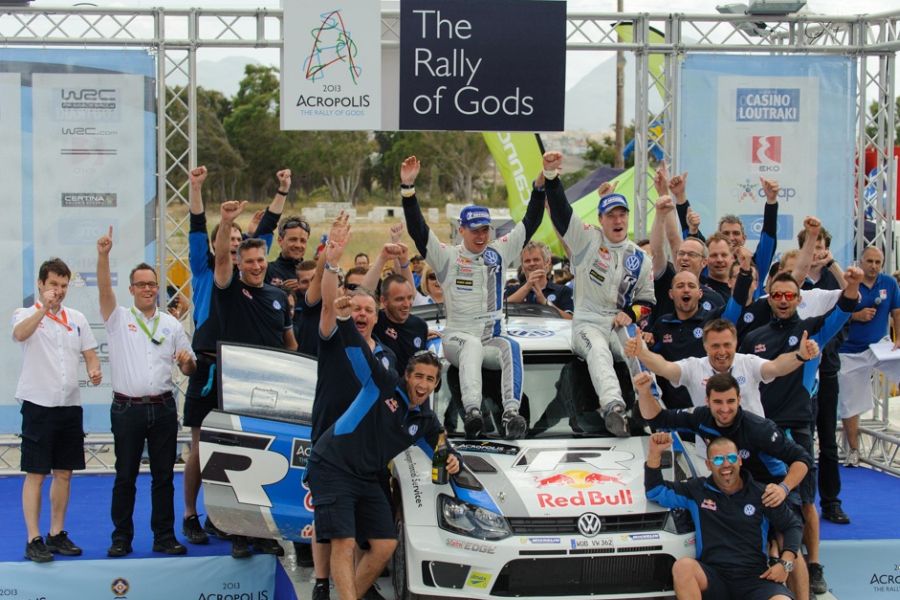
Jari-Matti Latvala was the last WRC winner in Greece back in 2013
Loutraki as a base since 2009, back to Lamia in 2016
A city of Loutraki, on the banks of the Gulf of Corinth, became a rally base in 2009. A year later, the Acropolis Rally hasn’t been held due to a difficult economic situation in Greece. It returned to WRC calendar in 2011, again with Loutraki as a base. Greece was hosting WRC events until 2013, then being replaced by Rally Poland in 2014.
Since then, Acropolis Rally is a part of the European Rally Championship. The rally returned to its old rally base in Lamia in 2016. The winners of Greek ERC rounds were Craig Breen (2014), Ralfs Sirmacis (2016) and Kajetan Kajetanowicz two times in 2015 and 2017.
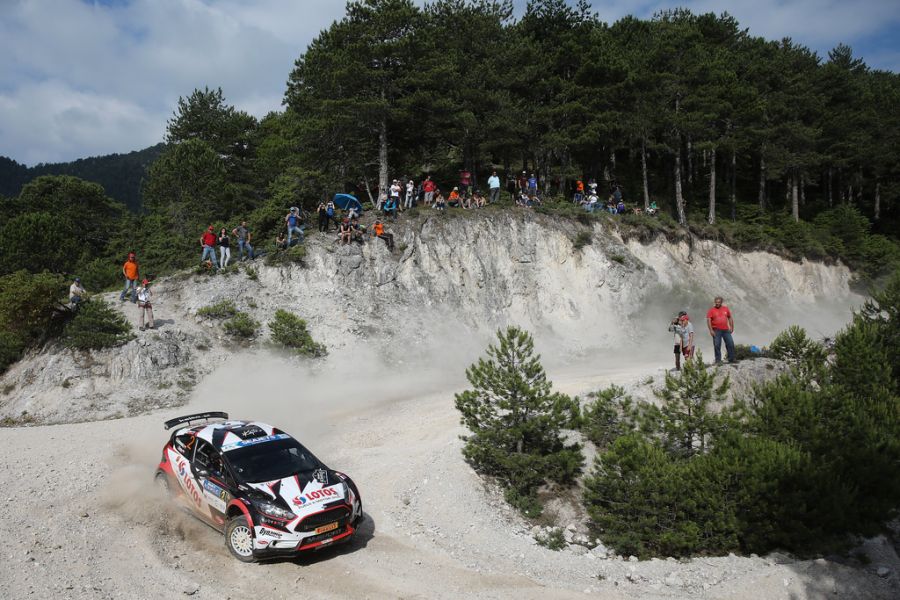
A scenery from Acropolis Rally
Historic Acropolis Rally
As a part of support programme, the Historic Acropolis Rally has been organized for the first time in 2002, a couple of weeks after WRC round. At first, regular entrants were Greek drivers with classic rally cars but, year by year, the event became more international. The last historic event took part in 2016.
That event was giving an opportunity to rally fans to see not just modern rally cars but also historically important old rally cars on the ancient stages of one of the most known rallies in the world.
Photos: Gregory Lenormand, Thomas Fenetre, Jorge Cunha, Wilfried Marcon/DPPI, Timo Anis, Petr Sagner, Leszek Kusmirek, Kostas Anagnostopoulos, Olivier Delhez/ewrc-results.com,






